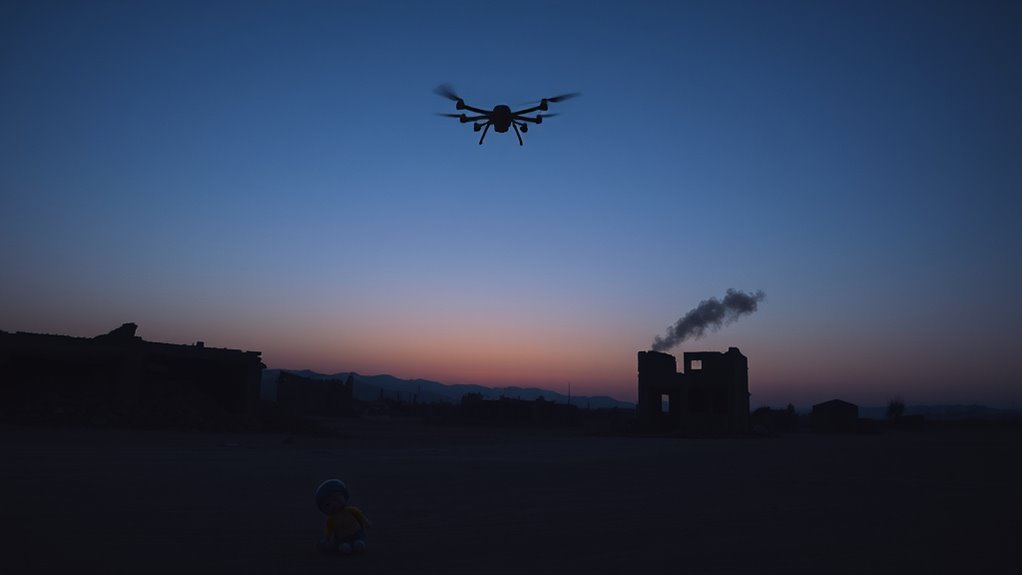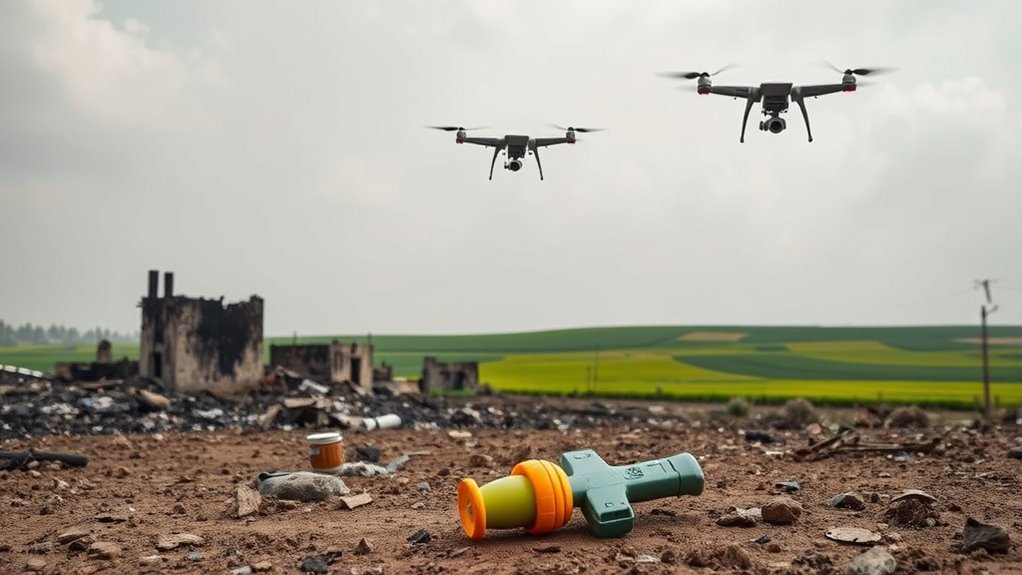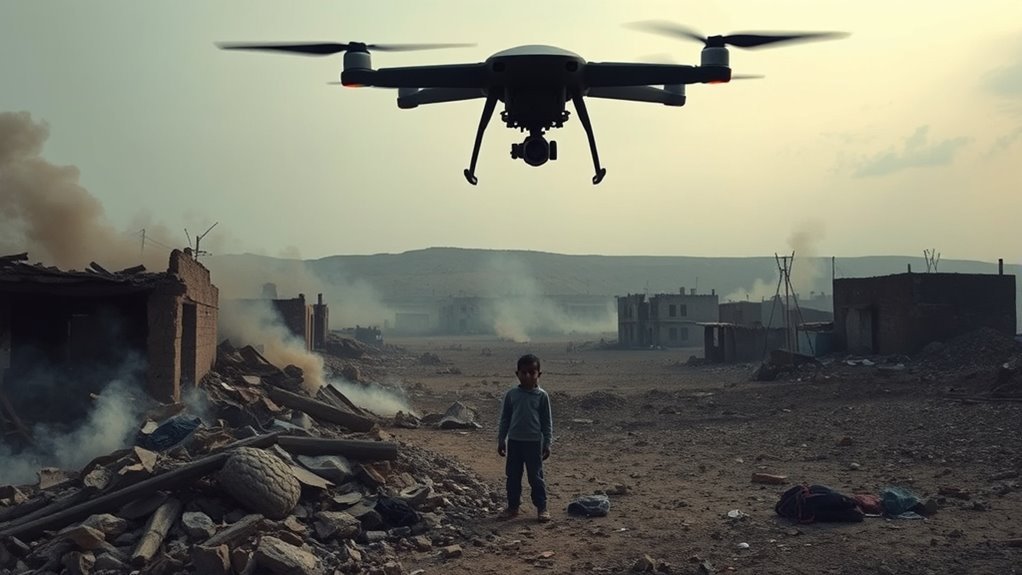Drone warfare is detrimental to civilian safety due to high rates of unintended casualties, creating ethical dilemmas in military operations. The psychological trauma experienced by affected communities fosters a culture of fear, undermining their daily lives and mental health. Additionally, the erosion of trust in governments and the challenges in accurately identifying targets complicate the situation further. These dynamics threaten regional stability and peace, raising questions about the long-term implications. Discover more about these pressing issues.
The High Cost of Civilian Casualties

The tragic reality of civilian casualties in drone warfare underscores the profound moral and ethical dilemmas faced by military strategists. You might recognize that while drones are often promoted as tools for precision, the collateral damage they cause raises significant concerns about civilian protection. Ethical considerations become paramount when evaluating the justifications for such strikes, especially when innocent lives are lost. The disparity between military objectives and the unintended consequences for non-combatants highlights a troubling paradox. As you contemplate the implications, consider how military leaders weigh operational success against the moral obligation to safeguard civilian life. Within this framework, the high cost of civilian casualties emerges not just as a statistic but as a critical factor that demands accountability and a reevaluation of strategies employed in modern warfare.
Psychological Impact on Affected Communities

You might consider how drone warfare creates an environment of constant fear and anxiety among affected communities, fundamentally altering their daily lives. This persistent threat can erode trust in local authorities and institutions, further isolating individuals. Additionally, the psychological trauma resulting from such warfare often leads to widespread mental health issues, complicating recovery and resilience in these populations.
Constant Fear and Anxiety
While the immediate physical dangers of drone warfare are often highlighted, the psychological toll on affected communities can be just as devastating. Living under constant surveillance creates an environment where fear and anxiety permeate daily life. You might find yourself constantly on edge, aware that drones could strike at any moment. This sense of impending danger is a form of psychological warfare, undermining your sense of security and autonomy. Over time, the persistent dread can lead to severe mental health issues, affecting not just individuals but entire communities. The absence of safety and the knowledge that one’s life is subject to the whims of remote operators fosters a climate of distrust and hopelessness, further entrenching the psychological scars of drone warfare.
Loss of Trust
As communities grapple with the pervasive threat of drone strikes, the erosion of trust becomes a significant psychological consequence. When civilian safety is compromised, you may find yourself questioning the motives behind these military actions. The lack of accountability measures deepens this skepticism, making you wonder if your government values your life. Transparency issues further exacerbate feelings of betrayal, leading to a pervasive atmosphere of suspicion. You might feel that decisions affecting your community are made in secrecy, leaving you powerless and voiceless. This loss of trust can fracture relationships between citizens and authorities, undermining social cohesion. Consequently, it becomes increasingly difficult to foster a sense of security and community resilience, essential for the well-being of any free society.
Trauma and Mental Health
The psychological impact of drone warfare on affected communities often manifests in profound trauma and mental health issues. You might notice that the constant threat of surveillance and strikes creates a pervasive sense of fear and anxiety, disrupting daily life. Trauma recovery becomes a formidable challenge, as many lack access to adequate mental health support.
- Increased prevalence of PTSD among civilians
- Development of chronic anxiety and depression
- Erosion of community bonds and trust
- Hindered access to resources for mental health care
Understanding these effects is essential. Addressing the psychological scars left by drone warfare isn’t just about immediate relief; it requires long-term commitment to rebuilding societal resilience and providing thorough mental health support.
Erosion of Trust in Governments and Institutions

When governments employ drone warfare in conflict zones, they risk not only civilian safety but also the erosion of trust in public institutions. This creates a dangerous cycle where public perception of government accountability diminishes. If citizens perceive their government as indifferent to civilian casualties, they’re less likely to support or believe in its policies.
| Factor | Impact on Trust | Example |
|---|---|---|
| Civilian Casualties | Decreases trust | Distrust in motives |
| Lack of Transparency | Erodes credibility | Skepticism about goals |
| Inconsistent Messaging | Confusion and fear | Misinformation spread |
Ultimately, a government’s reliance on drone strikes can lead to a profound disconnect between authority and the public, undermining the very fabric of democratic accountability.
The Challenge of Identifying Targets Accurately
When it comes to drone warfare, accurately identifying targets poses significant challenges. You need to contemplate the limitations of intelligence-gathering methods, which can lead to misidentification and, consequently, civilian casualties. This reality raises critical questions about the effectiveness and ethics of drone strikes in conflict zones.
Target Identification Limitations
While advancements in drone technology have revolutionized modern warfare, accurately identifying targets remains a significant challenge. Even with sophisticated target recognition technologies, intelligence failures can lead to catastrophic consequences. You might consider the following limitations:
- Reliability of Data: Information can be outdated or incorrect, skewing target assessments.
- Environmental Factors: Weather and terrain can obscure visual recognition, complicating identification.
- Human Oversight: Dependence on operators may introduce bias or error in interpreting intelligence.
- Complexity of Conflicts: In asymmetric warfare, distinguishing between combatants and civilians is often murky.
These factors collectively raise serious concerns about the effectiveness of drone strikes, especially when civilian safety hangs in the balance. You should ponder the ethical implications of relying on technology that can misidentify targets.
Civilian Casualty Risks
Despite the advancements in drone technology, the risk of civilian casualties remains a pressing concern due to the inherent challenges of accurately identifying targets. You must consider that misidentification can lead to devastating consequences, including civilian displacement and exacerbation of existing humanitarian crises. Drones often lack the nuanced understanding of ground realities that human intelligence provides, making it difficult to distinguish combatants from non-combatants. This uncertainty can result in strikes on civilian gatherings, further entrenching communities in fear and instability. As innocent lives are jeopardized, the ethical implications of drone warfare become increasingly troubling. Ultimately, the potential for collateral damage calls into question the justification of using drones in conflict zones where civilian safety is paramount.
The Normalization of Violence in Conflict Zones
As drone warfare becomes increasingly prevalent, the normalization of violence in conflict zones raises pressing ethical and humanitarian concerns. You might not realize how the normalization effects shape violence perception, altering societal attitudes towards conflict. This shift can lead to a dangerous desensitization, making violence seem routine rather than exceptional.
- Civilians may begin to accept aerial strikes as a standard response to threats.
- The psychological impact can foster a culture of fear and mistrust.
- Communities could experience increased trauma, affecting future generations.
- Humanitarian efforts might be undermined as violence becomes normalized.
In this context, understanding the implications of drone warfare on civilian safety becomes vital in advocating for more humane conflict resolutions.
Long-term Consequences for Regional Stability
Although drone warfare may offer immediate tactical advantages, its long-term consequences for regional stability are profound and complex. You might not realize that the use of drones can alter regional power dynamics, often empowering non-state actors and insurgent groups. As these entities gain capabilities, they can challenge existing governments, leading to increased instability. The geopolitical implications are significant; nations may feel compelled to engage in arms races or retaliatory strikes, further escalating tensions. Additionally, civilian casualties fuel resentment and cycles of violence, undermining any potential for peace. In the long run, drone warfare could create a volatile environment where freedom is stifled, and regional cooperation deteriorates, ultimately making the world less secure for everyone involved.
Frequently Asked Questions
How Do Drone Strikes Affect Local Economies in Conflict Zones?
Drone strikes often lead to economic disruption in conflict zones, reducing local employment opportunities. You might notice businesses collapsing and a lack of investment, which greatly hinders communities’ recovery and long-term stability.
What Legal Frameworks Govern the Use of Drones in Warfare?
You’re exploring legal frameworks governing drones in warfare, which encompass drone regulations and military ethics. These aspects aim to balance operational effectiveness with accountability, yet often struggle to protect civilian rights amidst evolving conflict dynamics.
Are There Alternatives to Drone Warfare for Military Operations?
You might consider alternatives like deploying ground troops for direct engagement or enhancing cyber warfare capabilities, which can disrupt enemy operations without risking civilian lives, ultimately fostering more ethical and strategic military operations.
How Do Drones Impact Humanitarian Aid Delivery?
Imagine a tightrope walker balancing precariously; drones in humanitarian aid can be just as delicate. While they enhance drone logistics and aid coordination, reliance on them can disrupt local efforts and undermine community resilience.
What Role Do Media Play in Shaping Public Perception of Drone Warfare?
Media portrayal greatly influences public opinion on drone warfare. By framing narratives and emphasizing specific incidents, it shapes perceptions, often overshadowing the complexities and consequences, which can lead to misinformed views on its ethical implications.

